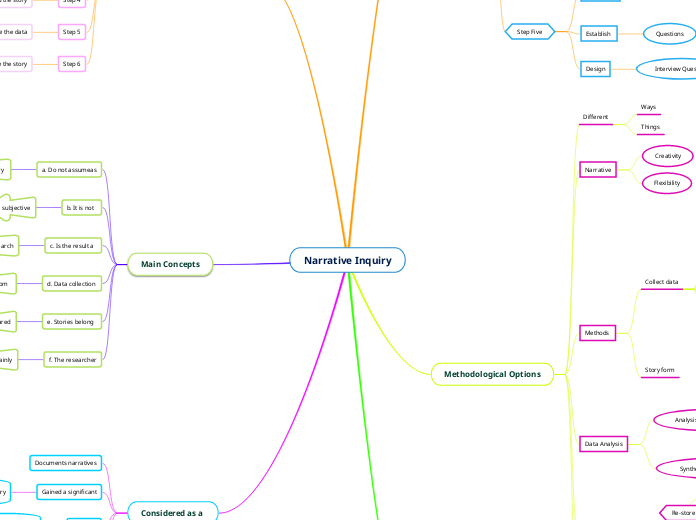Narrative Inquiry
Steps
Step One
Select
Problem
Determine
Research Question
Develop
Rationale
Reasons
Step Two
Interview questions
Select
Participants
Diversity
Not generalization
Literature Review
Step Three
Establish
Good communication
Respect
Trust
between
Particiánts
Researchers
Step Four
Conduct
Pilot
Design
Draft
Review
Interview Questions
Check
Technique
Step Five
Transcribe
Establish
Questions
Right
Wrong
Design
Interview Questions
2nd Inteview
Methodological Options
Different
Ways
Things
Narrative
Creativity
Flexibility
Methods
Collect data
Interviews
Face-to-face
Online
Observations
Field notes
Journals
Blogs
Story form
Data Analysis
Analysis of story content
Code themes
Categorize
Look for patterns
Synthesizing the experiences
Re-store data
Stories
Epistemology
Lived experiences
Complex
Ambiguous
Subjective
Aim
Details
Examine
Understand
References
Barkhuizen, G. (2022). Ten Tricky Questions about Narrative Inquiry in Language Teaching and Learning Research: And what the answers mean for qualitative and quantitative research. LEARN Journal: Language Education and Acquisition Research Network, 15(2), 1-20. https://so04.tci-thaijo.org/index.php/LEARN/index
Organizing and presenting data and results
Step 1
Code
The interviews transcripts
Step 2
Categorize
Codes
Step 3
The interviews codes
Configure stories
Step 4
Send the story
Explanation of the developed work
Step 5
Organize the data
Using coding ¨code words¨
Step 6
Assamble the story
Encloses and enclosures codes
Main Concepts
a. Do not assumeas
narrative inquiry
a story to tell
b. It is not
subjective
description
c. Is the result a
process of research
based on data collection
d. Data collection
come from
in depth-interviews
e. Stories belong
to shared
experiences by the participants
f. The researcher
to be mainly
a listener during the inteview
Considered as a
Documents narratives
Gained a significant
In the last century
Establish
Good communication
with help
design a good questionnaire
Role during interview
Is more
Being a good listener
